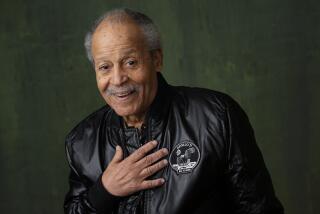William Melton; One of the Tuskegee Airmen
- Share via
William R. Melton, a World War II pilot and member of the famed Tuskegee Airmen--the first African American flying unit in the U.S. military--died Sept. 2 in Los Angeles of complications from heart disease and diabetes. He was 78.
As a fighter pilot, Melton flew more than 108 missions over North Africa and Europe, guarding B-17 bombers that were crucial to the air campaign against the Axis.
Born in New Mexico, the son of a career Army enlisted man, Melton lived in New York until he was 9, when his father was transferred to Arizona. Melton graduated from high school in Tucson and was going to college when World War II broke out.
He enlisted as a pilot in what was then the Army Air Corps and was assigned to the all-black unit, which trained on single-engine planes at a dusty airfield in Tuskegee, Ala.
Conditions were difficult for the cadets, most of whom were college educated. They were segregated from white officers and instructors, housed in separate quarters and barred from white dining halls or the white sections of trains.
In overseas theaters, the Tuskegee Airmen had their own operational bases and rest camps, separate from white units.
“You could have the Distinguished Flying Cross and the [French] Croix de Guerre, but you were still treated as a subhuman individual,” Melton told a reporter after the war.
Even though the War Department formed the unit in January 1941, the 332nd Fighter Group faced opposition from within the Army and did not see combat until June 1943.
The group’s war record was exemplary, however. Piloting mainly P-51 Mustangs, the men flew 1,578 missions over Europe and North Africa, destroyed more than 600 planes and earned the distinction of never losing a single bomber they escorted to enemy fighters.
“We had a reputation of not using those bombers as bait,” Melton said, referring to the practice some units followed of leaving bombers exposed to attract enemy planes. “We stayed with the bombers. That was our primary mission. To get them in and out of there [combat] with a minimum of loss.”
The group’s success was cited as proof that the military should be desegregated, which President Harry S. Truman ordered in 1948.
When his tour of duty was up, Melton returned to Tuskegee to serve as a flying instructor. He stayed in the service and saw action in the Korean War before being discharged in 1953.
After earning his degree from UCLA, Melton had a varied career selling real estate and was a founding member of Willing Workers Inc., a charitable agency serving mentally handicapped adults. He was a member of the airport advisory committee for the city of Los Angeles and was active in the civil rights movement.
He remained associated with the Tuskegee Airmen throughout his life, serving as public relations officer, historian and assistant to several of its national presidents, among other duties.
Melton is survived by his wife, Tomie; two of her children by a previous marriage, Lynda Doris and Walter Richard Simpson; and his son, William Michael.


